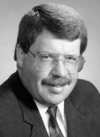
Vol. 75, No. 3, March
2002
Don't misrepresent your expertise
Communicating Your Practice Area
Lawyers may identify their practice focus areas
but may not state they're a specialist or certified in a particular
field unless they meet certain criteria.
by Dean R. Dietrich
 Dean R. Dietrich,
Marquette 1977, of Ruder, Ware & Michler L.L.S.C., Wausau, is chair
of the State Bar Professional Ethics Committee.
Dean R. Dietrich,
Marquette 1977, of Ruder, Ware & Michler L.L.S.C., Wausau, is chair
of the State Bar Professional Ethics Committee.
Question
I limit my practice to a specific area of the law. Am I allowed to
communicate that to the public and what are the risks if I do so?
Answer
Lawyers generally are allowed to communicate to the public regarding
the services they provide provided the communication is not false or
misleading. SCR 20:7.1 provides that a communication is false or
misleading if it "(1) contains a material misrepresentation of fact or
law, or omits a fact necessary to make the statement considered as a
whole not materially misleading; (2) is likely to create an unjustified
expectation about results the lawyer can achieve or states or implies
that the lawyer can achieve results by means that violate the Rules of
Professional Conduct or other law; (3) compares the lawyer's services
with other lawyers' services, unless the comparison can be factually
substantiated; or (4) contains any paid testimonial about, or paid
endorsement of, the lawyer without identifying the fact that payment has
been made..." The prohibition against false or misleading statements is
the fundamental rule for communication about a lawyer's services; a
lawyer may not identify that he or she is a specialist in a particular
area of law unless certain criteria are met.
SCR 20:7.4 provides that "a lawyer may communicate the fact that the
lawyer does or does not practice in particular fields of law." This
general rule allows the lawyer to communicate regarding areas of focus
in the lawyer's practice. The rule further provides that a lawyer shall
not state or imply that the lawyer is a specialist except if: 1) the
lawyer is admitted to engage in patent practice before the United States
Patent and Trademark Office; 2) the lawyer is engaged in admiralty
practice; or 3) the lawyer has been certified as a specialist in a field
of law by a named organization or authority, but only if that
organization or authority has been accredited by the American Bar
Association. Thus, under this rule, a lawyer may not identify herself as
a specialist unless the lawyer has been certified as a specialist by an
organization that has been accredited by the American Bar Association
and thereby allowed to identify specialists. Based upon these rules, the
lawyer is permitted to identify to the public that she practices in
specific areas or fields of law or that she will not perform services
except in particular areas or fields of law, but she may not call
herself a specialist or certified lawyer except in limited
situations.
If the lawyer decides to limit his practice, the lawyer also must
recognize that there are potential liabilities that result from that
decision. In a 1995 Wisconsin Court of Appeals decision, Duffey Law
Office S.C. v. Tank Transport Inc., 194 Wis. 2d 674 (Ct. App.
1995), the court was asked to identify "what standard of care applies in
a legal malpractice action" in a case where the attorney held himself
out to be an expert in a particular field of law. The court of appeals
acknowledged the finding of the Wisconsin Supreme Court in
Helmbrecht v. St. Paul Insurance Co., 122 Wis. 2d 94 (1985), in
which it was held that "an attorney must be held to undertake to use a
reasonable degree of care and skill, and to possess to a reasonable
extent the knowledge requisite to a proper performance of the duties of
his profession" and "is bound to exercise his best judgment in light of
his education and experience." The court of appeals then went on to
state:
"Specialization raises the question whether the standard of care
devised for the 'ordinary' attorney suffices for the practice of law in
modern time. The answer, with increasing frequency, is that an attorney
undertaking a task in a specialized area of the law must exercise the
degree of skill and knowledge possessed by those attorneys who practice
in that specialty."
The court then found that an attorney should be held to the standard
of the class to which he or she belongs. Because the attorney presented
himself as an expert in a particular field, he must be held to a
standard of care that is consistent with that representation. The matter
was remanded to the trial court to determine if the lawyer violated that
higher standard of care.
Attorneys must understand that they are allowed to identify the areas
of focus in their legal practice but may not state that they are a
specialist or certified as an expert in a particular field unless they
meet one of the exceptions identified in SCR 20:7.4. If an attorney
identifies her practice as limited to a specific area of law, however,
she may be subject to a higher standard of care and performance based
upon "the degree of skill and knowledge possessed by those attorneys who
practice in the specialty area."
Wisconsin
Lawyer
